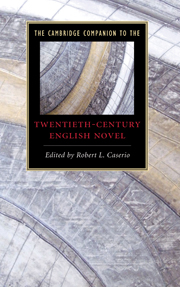Book contents
- Frontmatter
- Introduction
- 1 The art of English fiction in the twentieth century
- 2 The British Empire and the English modernist novel
- 3 Realism and rebellion in Edwardian and Georgian fiction
- 4 The Great War in English fiction
- 5 Postwar modernism in the 1920s and 1930s: The mammoth in the basement
- 6 Regionalism in English fiction between the wars
- 7 Ireland and English fiction
- 8 Feminist fiction
- 9 Working-class fiction across the century
- 10 World War II, the welfare state, and postwar “humanism”
- 11 The Windrush generation
- 12 History in fiction
- 13 Postmodernisms of English fiction
- 14 Detectives and spies
- 15 The post-consensus novel: Minority culture, multiculturalism, and transnational comparison
- 16 An absurd century: Varieties of satire
- 17 The other side of history: Fantasy, romance, horror, and science fiction
- Further reading
- Index
Introduction
Published online by Cambridge University Press: 28 July 2009
- Frontmatter
- Introduction
- 1 The art of English fiction in the twentieth century
- 2 The British Empire and the English modernist novel
- 3 Realism and rebellion in Edwardian and Georgian fiction
- 4 The Great War in English fiction
- 5 Postwar modernism in the 1920s and 1930s: The mammoth in the basement
- 6 Regionalism in English fiction between the wars
- 7 Ireland and English fiction
- 8 Feminist fiction
- 9 Working-class fiction across the century
- 10 World War II, the welfare state, and postwar “humanism”
- 11 The Windrush generation
- 12 History in fiction
- 13 Postmodernisms of English fiction
- 14 Detectives and spies
- 15 The post-consensus novel: Minority culture, multiculturalism, and transnational comparison
- 16 An absurd century: Varieties of satire
- 17 The other side of history: Fantasy, romance, horror, and science fiction
- Further reading
- Index
Summary
The following chapters attempt a comprehensive overview of the twentieth-century English novel. Their attempt is unusual, because literary history customarily divides the last century into distinct halves. The first half of the customary division, ending with World War II, focuses on modernist authors and works and their contexts, and thereby consolidates modernism's great achievements in fiction. The second half hypothesizes a postmodern age, and treats fiction in light of hypotheses about what postmodernism is (one of the hypotheses is that postmodernism abandons thinking in terms of great artistic achievements). Sound, subtle and fruitful reasoning, by numerous distinguished commentators, justifies such an apportionment of literary history. But the separation also tends to compartmentalize knowledge, and to insure itself against challenge.
Although compartmentalizing need not refute continuities, it does not always stimulate awareness of them. This volume, bridging pre-1945 and post-1945 fiction, searches out more continuities between modernism and postmodernism than meet the eye. It explores dynamic similarities as well as contrasts among novels that span generational, cultural, and contextual differences. It is common for literary historians to consider post-Windrush novelists, who left behind their colonial origins in exchange for life in London, as doubly figures of exile: dislocated from their first home, yet unable to be at ease in their second home, hence perpetually diasporic. What is not common is for literary historians to consider ways in which such an exilic condition is prefigured in the modernist moment, and is attached to it - in terms of repetition and variation - via Henry James, Conrad, Joyce, and Lawrence's self-imposed exiles, or in terms of feminist or “minority” writers who feel internally if not externally exiled from gender roles or social orders that regulate their experience.
- Type
- Chapter
- Information
- Publisher: Cambridge University PressPrint publication year: 2009
- 1
- Cited by



